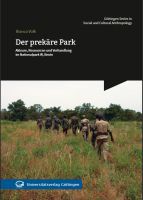Der prekäre Park - Akteure, Ressourcen und Verhandlung im Nationalpark W, Benin
Author(s)
Volk, Bianca,
Collection
AG UniversitätsverlageLanguage
GermanAbstract
W National Park lies in the border triangle of Benin, Burkina Faso and Niger in West Africa. Established under French colonial rule in 1927, it was designated as the first African transborder biosphere reserve in 2002. Although the Benin part of the reserve was given a participatory management approach in 2002, illegal hunting, logging, transborder mobile herding and cash cropping continue to pose important threats to the reserve. The whole area, especially the buffer zone, is a source of conflicts between the different adjacent communities and between communities and park administration. The book analyses how the surveillance teams operate in this context. It describes encounters between park surveillance staff and local stakeholders in three different arenas: the park’s core area, adjacent villages and public political forums. It shows how, in a setting dominated largely by cash crop production, the abstract idea „national park“ is being translated by park staff and how in the process local meanings of the idea emerge. Drawing on 14 months of ethnographic research between 2008 and 2010, this book contributes to the current state of research on participatory natural resources management. Moreover, it provides insights into the working of state administration in a context of contradictory policies of conservation and rural development. Der grenzüberschreitende Nationalpark W liegt in Westafrika im Dreiländereck von Benin, Burkina Faso und Niger. 1927 unter französischer Kolonialherrschaft gegründet, erfolgte 2002 die Ausrufung zum ersten grenzüberschreitenden Biosphärenreservat Afrikas. Trotz diverser partizipativer Maßnahmen der Parkverwaltung gefährden Feldbau, grenzüberschreitende mobile Weidewirtschaft (Transhumanz), Wilderei und Holzeinschlag den Nationalpark. Konflikte um die Nutzung von Land und anderen kritischen Ressourcen entstehen insbesondere in der überregulierten Pufferzone. Dieses Buch fragt, wie Überwachungseinheiten in diesem Kontext operieren. Es beschreibt typische Situationen des Zusammentreffens zwischen Parküberwachung und lokalen Akteuren in drei unterschiedlichen Arenen: der Kernzone des Parks, dem Anrainerdorf und lokalen politischen Foren. Die dichten Fallstudien verdeutlichen die konfliktreichen Prozesse, in denen die Idee „Nationalpark“ von Akteuren der Parkverwaltung und ihren lokalen Mitarbeitern in den Kontext der Baumwollstadt Banikoara übersetzt wird und wie der Nationalpark in diesen Prozessen zu einer lokalen Bedeutung gelangt. Das Buch, das auf einer vierzehnmonatigen Feldforschung zwischen 2008 und 2010 basiert, setzt neue Impulse für die Weiterentwicklung partizipativer Ansätze in Ressourcenschutzgebieten und benennt die Herausforderungen staatlichen Handelns im Spannungsfeld von Ressourcenschutz und cash crop-orientierter ländlicher Entwicklungspolitik.
Keywords
biosphere reserve; national park; participatory natural resources managementDOI
10.17875/gup2019-1129ISBN
9783863953980OCN
1100490587Publisher
Universitätsverlag GöttingenPublication date and place
2019Classification
Society and Social Sciences


 Download
Download Web Shop
Web Shop